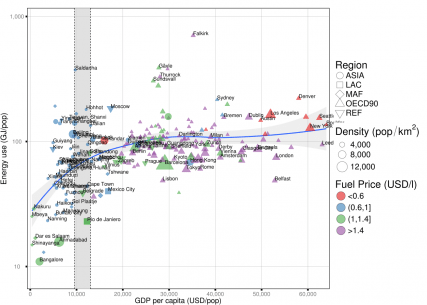Study shows that smart urbanization could save up to 25% of global energy use by 2050
A new study suggests that urban planning and transport policies can limit the future increase in cities’ energy use by about one-quarter in 2050. The limitation of future consumption is particularly critical, as current urbanization trends suggest that world-wide urban energy use will more than triple by 2050. A new study published in the Proceedings of the National Academy of Sciences, demonstrates that cities in developing countries throughout Asia, Africa and the Middle East have the highest potential for energy savings through urbanization – 86 percent of the world’s total potential savings. In order to achieve these savings, however, current and future urban planning methodologies must focus short commutes between home and work places – driven by mutually supportive public transportation and land use development.
The team of researchers behind this study, including Giovanni Baiocchi, an Associate Professor in the University of Maryland’s Department of Geographical Sciences, together with researchers at the MCC, Yale University and the Potsdam Institute for Climate Impact Research, produced the first typology of cities based on their energy use and associated emissions, useful at tailoring mitigation measures for different cities.
Link to paper: http://www.pnas.org/content/early/2015/01/07/1315545112.full.pdf
Please click here for the UMD Press Release
Related articles: Scientific American, BBC
Published on Mon, 01/12/2015 - 17:41


